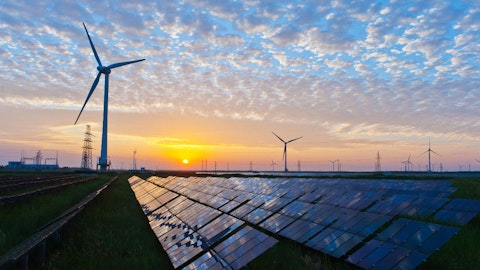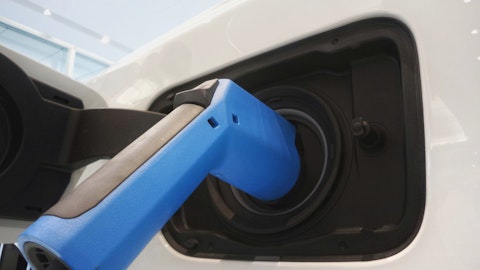Jason Few: Noel, thank you for your question. So as we think about what we’re seeing with customers, and you think about what we’ve just done with Toyota, well, many of the things that we’re doing are new applications in the way in which we’re using our platform. What’s important to note about that is that it’s our same existing platform. We’re just extending the capabilities of that platform to deliver additional value. So, the same carbonated platform that we commercialized in 2003 is the same platform we deployed at the Port of Long Beach in support of the Toyota opportunity. Yet, we’re delivering hydrogen and water from that platform in addition to power. We see that as a great example of where customers will now be able to see a real commercial implementation of that platform.
And we think that will help us drive additional opportunities around the Tri-gen platform as an example. We are seeing, customer interest and way in which we’re building our pipeline growing even without the clarity around IRA and especially when you think about globally, because, we’re not just focused in the U.S. but you’ve got programs in the EU, you’ve got programs in Korea, all of which drive strong tailwinds that, that really support the business that we’re in. And when you think about what’s really happened, net zero in countries around the world have been legislated in. And so companies are going to find ways to get there, and we think that you will see even more states in the U.S., take more progressive attitudes like what you are seeing in California, like what we just talked about, and the expansion of, and support for renewable fuels, we think that all serves us really well to help to drive our business, especially some of the advantages we have.
For example, when you think about renewable fuels, the fact that we can use renewable fuels directly coming out of an anaerobic digester as opposed to needing those fuels to get the pipeline quality gas as an example, which we think gives us an advantage, lowers the cost of the fuel and puts us in a position to deliver, carbon neutral to carbon negative power. So we are really excited about that. And as we look at our pipeline we are seeing growth happening despite of the IRA. But there is no question that customers really want to understand in the U.S. how to really fully maximize the IRA, but we will continue to take advantage of the investment tax credit. We think we’re in a really strong position around a project like Toyota to take advantage of the production tax credit.
When you think about the incremental benefits, we are a U.S. manufacturer. We largely use U.S. based content in our platform. And we use labor that are at prevailing wages, so all of those things continue to ladder up as just incremental benefits to bring down the cost for the customer, and to create a different set of economics for us. Getting, there are instances where you can get almost up to 50% through the IRA based on the way in which we are configured as a company. So, we are pretty excited about that.
Noel Parks: Great. Thanks. And, I just wanted to turn to the ExxonMobil JV. And I was just curious about a couple things, I guess, just sort of the working relationship. They are a huge company and sort of their internal process. And maybe how it affects progress in the JV, you have had a number of extensions of the agreement. And I guess just even more on a practical level, do you have any thoughts about the process that’s left before — in the pipeline before? There’ll be more info about, for example, the timing of plans at Rotterdam for a capture installation there.
Jason Few: No. Thank you. I don’t want to speak on behalf of Exxon, but I think it’s clear from their public pronouncements that, they are committed to their low carbon business. Our technology is directly supportive of what Darren has talked about and Dan Ammann have talked about in terms of their low carbon business. And so, we feel really good about that. They have been clear that they expect to get to FID decision later this year on a demonstration project. So, we think that will happen. So, I think you are seeing Exxon operate very differently with their low carbon business. And they have — and we think that, that will be benefit for us as well. And so, they have got a strong commitment there and we are excited about it.
Operator: And this ends our question-and-answer session. I will now turn the call back over to Mr. Jason Few for some final closing remarks.
Jason Few: Rob thank you. We want to take a moment to acknowledge and honor the victims’ families and communities impacted by September 11th. As a Connecticut based company today, our thoughts are with those impacted in our community. As a company, we will continue to execute on our powerhouse business strategy with the goal of delivering growth and optimizing returns. Thank you all for joining the call today and for your interest in FuelCell Energy. We look forward to updating you again next quarter and have a great day.
Operator: This concludes today’s conference call. Thank you for your participation. You may now disconnect.
Follow Fuelcell Energy Inc (NASDAQ:FCEL)
Follow Fuelcell Energy Inc (NASDAQ:FCEL)
Receive real-time insider trading and news alerts




